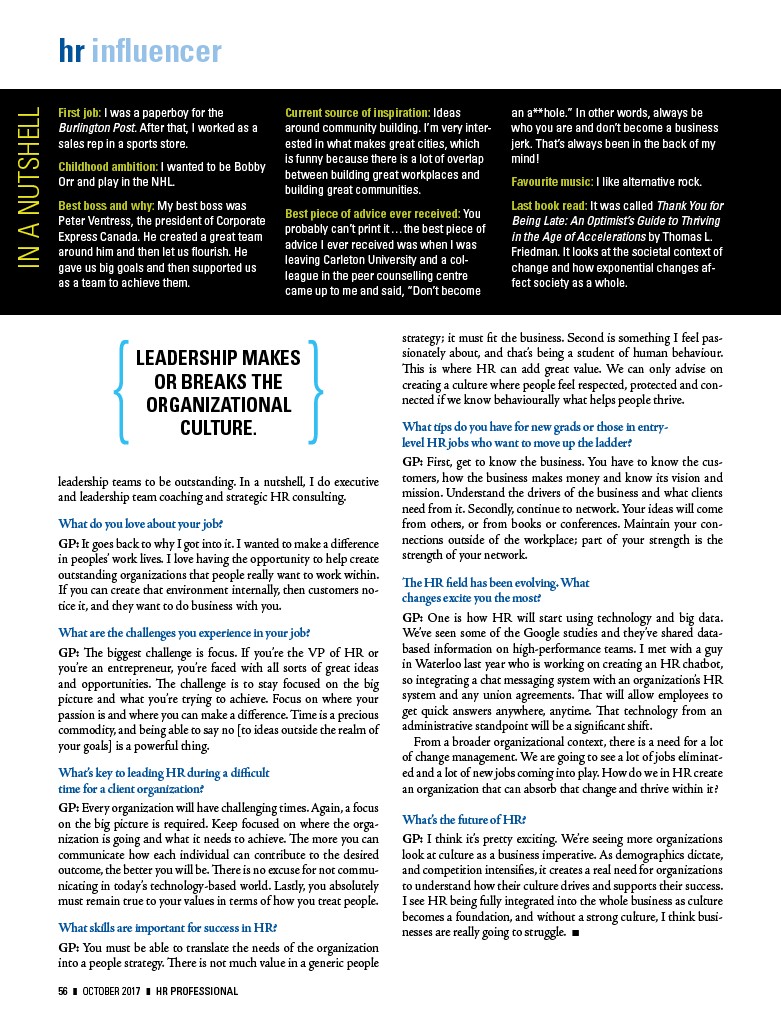
leadership teams to be outstanding. In a nutshell, I do executive
and leadership team coaching and strategic HR consulting.
What do you love about your job?
GP: It goes back to why I got into it. I wanted to make a difference
in peoples’ work lives. I love having the opportunity to help create
outstanding organizations that people really want to work within.
If you can create that environment internally, then customers no-tice
it, and they want to do business with you.
What are the challenges you experience in your job?
GP: The biggest challenge is focus. If you’re the VP of HR or
you’re an entrepreneur, you’re faced with all sorts of great ideas
and opportunities. The challenge is to stay focused on the big
picture and what you’re trying to achieve. Focus on where your
passion is and where you can make a difference. Time is a precious
commodity, and being able to say no to ideas outside the realm of
your goals is a powerful thing.
What’s key to leading HR during a difficult
time for a client organization?
GP: Every organization will have challenging times. Again, a focus
on the big picture is required. Keep focused on where the orga-nization
is going and what it needs to achieve. The more you can
communicate how each individual can contribute to the desired
outcome, the better you will be. There is no excuse for not commu-nicating
in today’s technology-based world. Lastly, you absolutely
must remain true to your values in terms of how you treat people.
What skills are important for success in HR?
GP: You must be able to translate the needs of the organization
into a people strategy. There is not much value in a generic people
strategy; it must fit the business. Second is something I feel pas-sionately
about, and that’s being a student of human behaviour.
This is where HR can add great value. We can only advise on
creating a culture where people feel respected, protected and con-nected
if we know behaviourally what helps people thrive.
What tips do you have for new grads or those in entry-level
HR jobs who want to move up the ladder?
GP: First, get to know the business. You have to know the cus-tomers,
how the business makes money and know its vision and
mission. Understand the drivers of the business and what clients
need from it. Secondly, continue to network. Your ideas will come
from others, or from books or conferences. Maintain your con-nections
outside of the workplace; part of your strength is the
strength of your network.
The HR field has been evolving. What
changes excite you the most?
GP: One is how HR will start using technology and big data.
We’ve seen some of the Google studies and they’ve shared data-based
information on high-performance teams. I met with a guy
in Waterloo last year who is working on creating an HR chatbot,
so integrating a chat messaging system with an organization’s HR
system and any union agreements. That will allow employees to
get quick answers anywhere, anytime. That technology from an
administrative standpoint will be a significant shift.
From a broader organizational context, there is a need for a lot
of change management. We are going to see a lot of jobs eliminat-ed
and a lot of new jobs coming into play. How do we in HR create
an organization that can absorb that change and thrive within it?
What’s the future of HR?
GP: I think it’s pretty exciting. We’re seeing more organizations
look at culture as a business imperative. As demographics dictate,
and competition intensifies, it creates a real need for organizations
to understand how their culture drives and supports their success.
I see HR being fully integrated into the whole business as culture
becomes a foundation, and without a strong culture, I think busi-nesses
are really going to struggle. n
First job: I was a paperboy for the
Burlington Post. After that, I worked as a
sales rep in a sports store.
Childhood ambition: I wanted to be Bobby
Orr and play in the NHL.
Best boss and why: My best boss was
Peter Ventress, the president of Corporate
Express Canada. He created a great team
around him and then let us flourish. He
gave us big goals and then supported us
as a team to achieve them.
Current source of inspiration: Ideas
around community building. I’m very inter-ested
in what makes great cities, which
is funny because there is a lot of overlap
between building great workplaces and
building great communities.
Best piece of advice ever received: You
probably can’t print it…the best piece of
advice I ever received was when I was
leaving Carleton University and a col-league
in the peer counselling centre
came up to me and said, “Don’t become
an a**hole.” In other words, always be
who you are and don’t become a business
jerk. That’s always been in the back of my
mind!
Favourite music: I like alternative rock.
Last book read: It was called Thank You for
Being Late: An Optimist’s Guide to Thriving
in the Age of Accelerations by Thomas L.
Friedman. It looks at the societal context of
change and how exponential changes af-fect
society as a whole.
hr influencer
IN A NUTSHELL
LEADERSHIP MAKES
OR BREAKS THE
ORGANIZATIONAL
CULTURE.
56 ❚ OCTOBER 2017 ❚ HR PROFESSIONAL